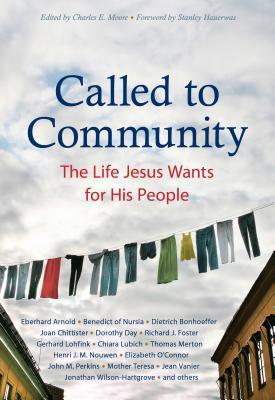
Called to Community: The Life Jesus Wants for His People, Charles E. Moore (ed.). Walden, NY: Plough Publishing House, 2016.
Summary: A collection of readings on Christian community centered around the Bruderhof Community but also including theologians and writers from throughout church history.
The Bruderhof communities, beginning with the initial ones formed by Eberhard Arnold, are in the vanguard of a movement among Christians longing for a greater depth of community than ordinarily experienced in congregational life, including intentional communities of Christians sharing accommodations and life together. This book represents a collection of writings published by Plough, the Bruderhof publishing arm, including Arnold and other Bruderhof authors, but also a diverse collection of writers on community including Benedict of Nursia, Eugene Peterson, George MacDonald, C. S. Lewis, Dietrich Bonhoeffer and Jean Vanier of the L’Arche communities. This volume, organized into 52 chapters that may be used by groups over a year, brings together some of the best writing by these and a number of other writers on community.
The book is organized into four parts. The first is “A Call to Community”. Gerhard Lohfink’s statement in the chapter on Embodiment was a stunner:
For many Christians it would not be a turning point in their lives if they decided, one day, to stop praying tomorrow, to leave off going to church next Sunday’.
This section challenges us to consider the call to something that is central rather than peripheral to our lives.
The next part is on “Forming Community.” It includes Dietrich Bonhoeffer’s telling observations on “Idealism” from his Life Together, and a wonderful contribution from fellow Ohio Art Gish on “Surrender.”
Part Three discusses “Life in Community.” The chapter on “Deeds” includes Mother Teresa talking about not despising small things, and John F. Alexander’s challenge to focus not on using gifts but cleaning toilets. Working through issues of “Irritations”, “Differences”, and “Conflict” the section concludes with essays by Richard Foster and Jean Vanier about “Celebration.”
The last section is titled “Beyond the Community”. One of the most moving essays is that by Emmanuel Katongole and Chris Rice describing how they “interrupted” a series of five minute reports at a World Congress to wash one another’s feet before the assembly. Several chapters in this section talk about boundaries and the real tension between compassion and self-care that allows one to continue to minister and recognizes personal limits. The collection ends with Dorothy Day’s incisive comments on “Mercy.”
The book includes a study guide with questions and scripture readings for each chapter as well as sources for further study. It seems the perfect resource for a group who wants to go deeper in community, whether they have formed a more intentional community or not.
One of the things that commends this collection is its catholicity, and the stature of those whose writings are included. To listen to those who have lived community across the centuries is to drink at a deep well of wisdom. This is not just the latest “new monastics” thinking or the latest offerings from the Emergent Church. The call to community is challenging, and yet the recognition of the real challenges of community both tempers naive enthusiasm and offers wise counsel to those who pursue intentional communities out of faithfulness to Christ.
Disclosure of Material Connection: I received this book free from the publisher via LibraryThing’s Early Reviewer program. I was not required to write a positive review. The opinions I have expressed are my own.
Editor’s Note: Thank-you to Bob Trube for sharing his reviews with Emerging Scholars! Bob first posted the above review on Bob on Books. Reading the review reminded me of the privilege I had to visit with Charles Moore and one of the Bruderhof Communities in Southwestern PA. At the time I very much desired to join the Bruderhof. Although that did not work out, I have really appreciated their writing and work in community. At the 2015 Urbana Student Missions Conference, I was surprised to see Plough Press up-and-running again (after a time of rest). Time to reconnect with Charles Moore to share some of the ways our family and ministry with InterVarsity Christian Fellowship has been influenced by their community. To God be the glory! ~ Thomas B. Grosh IV, Associate Director, Emerging Scholars Network
Bob Trube is Associate Director of Faculty Ministry and Director of the Emerging Scholars Network. He blogs on books regularly at bobonbooks.com. He resides in Columbus, Ohio, with Marilyn and enjoys reading, gardening, choral singing, and plein air painting.

Leave a Reply